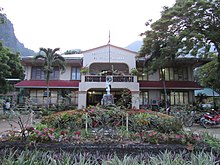El Nido, Palawan
[3] A managed resource protected area,[5] it is known for its white-sand beaches, coral reefs, and limestone cliffs, as well as for being the gateway to the Bacuit archipelago.Chinese traders regularly visited the area of Palawan for its edible birds' nests during the Song dynasty (960–1279).Chau Ju-Kua, a trade commissioner of the port of Chuan, wrote about the island, Pa-Lao-Yu or Land of Beautiful Harbors, in his book Chu Fan Chi.[5] In 1957, the following barrios were created: El Nido is situated in Bacuit Bay and covers a land area of 465.1 square kilometres (179.6 sq mi).The Permian to Paleogene rocks and limestone cliffs of El Nido are similar to those that can be found in Ha Long Bay in Vietnam, Guilin in China, as well as Krabi in Thailand, all of which are part of the Sunda Plate.A small but significant percentage of the population speaks or comprehends Cuyonon, the native language of the Cuyo Islands and most parts of Palawan.The vice mayor heads the legislative council consisting of eight councilors, more commonly known as Sangguniang Bayan members.In 1991, the rest of Bacuit Bay, including its island and islets, was proclaimed by the Philippine government as a marine reserve.In 1998, its status was elevated to that of a protected area, including the terrestrial ecosystem of El Nido and portions of Taytay.The Palawan Council for Sustainable Management (PCSD) provides legal assistance during the litigation of cases filed by the Protected Area Office (PAO).08 series 2000 from the National Integrated Protected Area Program (NIPAP) of the Department of Environment and Natural Resources (DENR).[38] El Nido, one of the country's most diverse ecosystems, is protected for its unique flora, fauna, and pristine geologic formations.The 60 kilometres (37 mi) national road between Taytay and El Nido was rehabilitated, and this has helped boost tourism and business activity in the area.Ten percent of the population can avail of the 'Level II Water System', or communal faucet,[48] by the municipal government, while the majority of them are still dependent on deep wells and natural springs.Recently, the Palawan State University opened its El Nido campus in New Ibajay, offering extramural programs and studies.






MunicipalityPhilippinesCountryRegionMimaropaProvincePalawan
1st districtFoundedBarangaysSangguniang BayanVice MayorMunicipal CouncilHouseholdsEconomyPoverty incidenceRevenueAssetsExpenditureLiabilitiesTime zoneZIP codearea codeNative languagesCuyononTagalogmanaged resource protected areaLate Neolithic AgeDewil Valleyedible birds' nestsSong dynastyChau Ju-Kuaport of ChuanChu Fan ChiTagbanwaCuyo IslandsSpaniardsChineseMunicipality of Taytayedible nestsswiftletscollocalia fuciphagalimestonecliffsSpanishLinapacan StraitSulu SeaSouth China SeaSulu ArchipelagoSunda PlatePhilippine Mobile BeltPermianPaleogeneHa Long BayVietnamGuilinThailandManilaPuerto PrincesapurokssitiosBuena SuertePhilippine Statistics AuthorityTagbanwasCuyunonsTagalogsHiligaynonBicolanosIlocanosJapaneseKoreansFilipinoEnglishVisayan languagesBicolanofishingagriculturetourismdiving locationEdible nest-gatheringCoconutcashewbananaCondé Nast TravelerSangguniang Bayan membersordinancesresolutionsnatural gasMalampaya SoundfarmingDepartment of Environment and Natural ResourcesterrestrialTaytayprotected areaconservationBantay DagatWorld Wildlife Fund - PhilippinesendemicthreatenedPalawan hornbillPalawan shamaPalawan titPalawan scops owlPalawan peacock pheasantmarine mammalsdolphinsdugongPalawan tree shrewPalawan stink badgerPalawan spiny ratPalawan anteaternorthern Palawan tree squirrelhawksbillolive ridleyleatherbackgreen sea turtlescoralsIsland TransvoyagerDornier 228El Nido AirportTricyclesPhilippine Ports AuthorityNational Power Corporationmegawattssolar panelsbroadband